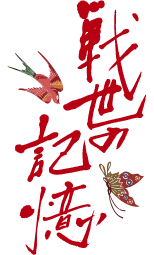
“Stolen Rice Ball” (War Destroys Humanity) For the peace, get along with the world, community, and friends-
“Stolen Rice Ball” (War Destroys Humanity)
For the peace, get along with the world, community, and friends-
Michiko Uehara (30上原美智子)
Date of birth: August 5, 1935
At the time: Nine-year-old elementary school student
Interviewer: Minami Kamiunten (granddaughter)
○ Around 7 o'clock in the morning on March 23, seven to nine enemy planes flew by at low altitude. The noise was so loud that I thought it would rupture my eardrums.
Interviewer: What did you do then, Grandma?
○ There was a big underground air raid shelter called Amansou-go, so we fled there.
Interviewer: Was it dark inside the shelter?
○ It was very dark. It was dark and there was also a strange smell. There were about 150 people from Odo (Odo, Itoman City) sitting there quietly. I was very scared.
Interviewer: What did you do about food?
○ Since it was early in the morning that day, we fled without eating anything. The baby whom my grandmother was carrying on her back had not had any milk either.
That baby started crying. Everyone was yelling: “The enemies will come if you let the baby cry. Whose baby is it? Don’t let it cry!”
Even I almost started crying. They tried soothing the baby, saying, “Hush, hush,” but it would not stop crying, and that made my 3-year-old brother start crying.
Then from a distance, old women we knew told us: “You people, get out of here.” She probably said that because if our baby cried, the 150 people who were here would be found by the enemy and get killed.
So, our grandma tried to soothe the baby and make it stop crying by covering its eye and mouth with a handkerchief she was carrying. The war had started and we were scared to go outside, and although we managed to get by staying there, we eventually had to to get out of the air raid shelter.
Interviewer: How many of your relatives died, Grandma?
○ My father died when he was 39 years old serving in the defense corps. I do not know where he died. I don’t even have a single photograph. My father was very gentle, always patting my head.
When my father left to join the defense corps, he departed with plenty of food such as carrots, sweet potatoes, and leaf vegetables loaded on a horse-drawn cart.
Before leaving, he called together us children and said: “I will be going to the defense corps and work there, so you all listen to your mother and behave well. I will now be going to war.” The gentle face of my father who patted me on my head still comes to mind even now.
Other than my father, four of my father’s brothers – my uncles – died as soldiers. My grandmother and my mother’s younger brother and his wife also died.
○ After the war had begun, we fled on foot to the Yanbaru area (northern Okinawa) around the middle of April. Intense fighting went on during the day time, so we fled during the night time.
The roads were full of people fleeing toward Yanbaru. At the time, I was a third-grader, walking with a school bag on my back, carring an emergency bag, and holding about 20 rice balls. There were eight of us fleeing together, but I could barely walk because the rice balls were heavy. Then, a middle-aged woman who was a stranger came over and said: “I feel sorry for you, so let me carry them for you.” I thought this was such a relief, so without thinking of anything, I said, “Thank you, please.” The woman quickly disappeared, and I ended up getting robbed of rice balls that were for two or three family members. Even now, I regret this incident.
As we somehow continued to flee after this, we fortunately became prisoners in the middle of the forest in Yanbaru, and thus managed to survive.
Interviewer: Were you barefoot when you fled to Yanbaru?
○ Yes, I was barefoot, and it hurt with my feet bleeding all over. Even then, we were in a very serious situation, and we hid in caves during the day time, trying very hard to protect my own life.
At the time, my mother got hurt, suffering a major injury. My younger brother died in the forest in Yanbaru. My older sister and I buried our younger brother. Our mother became depressed.
○ I hope that from now on in this world, children and grandchildren can live in peace and at ease in the 21st century. War must never be repeated. I hope that children, grandchildren, and young people like you can live affluent lives.
The important thing is to get along with other people. There must be no fighting in classrooms. I want you to get along with your friends and the people of the local community. I think that if the people of Japan and various countries in the world get along well in this way, it will lead to the peace.
○ When there is a war going on, even grandmas who were always gentle would say, “Get out of the shelter.” In last-minute situations, such as in a war, people become unaccommodating for the sake of protecting their own lives. So, people become inhumane. When a war breaks out, no one turns around even if you ask for help. I want to strongly emphasize that even the tenderness that people normally have disappears completely once a war breaks out.
For the peace, get along with the world, community, and friends-
Michiko Uehara (30上原美智子)
Date of birth: August 5, 1935
At the time: Nine-year-old elementary school student
Interviewer: Minami Kamiunten (granddaughter)
○ Around 7 o'clock in the morning on March 23, seven to nine enemy planes flew by at low altitude. The noise was so loud that I thought it would rupture my eardrums.
Interviewer: What did you do then, Grandma?
○ There was a big underground air raid shelter called Amansou-go, so we fled there.
Interviewer: Was it dark inside the shelter?
○ It was very dark. It was dark and there was also a strange smell. There were about 150 people from Odo (Odo, Itoman City) sitting there quietly. I was very scared.
Interviewer: What did you do about food?
○ Since it was early in the morning that day, we fled without eating anything. The baby whom my grandmother was carrying on her back had not had any milk either.
That baby started crying. Everyone was yelling: “The enemies will come if you let the baby cry. Whose baby is it? Don’t let it cry!”
Even I almost started crying. They tried soothing the baby, saying, “Hush, hush,” but it would not stop crying, and that made my 3-year-old brother start crying.
Then from a distance, old women we knew told us: “You people, get out of here.” She probably said that because if our baby cried, the 150 people who were here would be found by the enemy and get killed.
So, our grandma tried to soothe the baby and make it stop crying by covering its eye and mouth with a handkerchief she was carrying. The war had started and we were scared to go outside, and although we managed to get by staying there, we eventually had to to get out of the air raid shelter.
Interviewer: How many of your relatives died, Grandma?
○ My father died when he was 39 years old serving in the defense corps. I do not know where he died. I don’t even have a single photograph. My father was very gentle, always patting my head.
When my father left to join the defense corps, he departed with plenty of food such as carrots, sweet potatoes, and leaf vegetables loaded on a horse-drawn cart.
Before leaving, he called together us children and said: “I will be going to the defense corps and work there, so you all listen to your mother and behave well. I will now be going to war.” The gentle face of my father who patted me on my head still comes to mind even now.
Other than my father, four of my father’s brothers – my uncles – died as soldiers. My grandmother and my mother’s younger brother and his wife also died.
○ After the war had begun, we fled on foot to the Yanbaru area (northern Okinawa) around the middle of April. Intense fighting went on during the day time, so we fled during the night time.
The roads were full of people fleeing toward Yanbaru. At the time, I was a third-grader, walking with a school bag on my back, carring an emergency bag, and holding about 20 rice balls. There were eight of us fleeing together, but I could barely walk because the rice balls were heavy. Then, a middle-aged woman who was a stranger came over and said: “I feel sorry for you, so let me carry them for you.” I thought this was such a relief, so without thinking of anything, I said, “Thank you, please.” The woman quickly disappeared, and I ended up getting robbed of rice balls that were for two or three family members. Even now, I regret this incident.
As we somehow continued to flee after this, we fortunately became prisoners in the middle of the forest in Yanbaru, and thus managed to survive.
Interviewer: Were you barefoot when you fled to Yanbaru?
○ Yes, I was barefoot, and it hurt with my feet bleeding all over. Even then, we were in a very serious situation, and we hid in caves during the day time, trying very hard to protect my own life.
At the time, my mother got hurt, suffering a major injury. My younger brother died in the forest in Yanbaru. My older sister and I buried our younger brother. Our mother became depressed.
○ I hope that from now on in this world, children and grandchildren can live in peace and at ease in the 21st century. War must never be repeated. I hope that children, grandchildren, and young people like you can live affluent lives.
The important thing is to get along with other people. There must be no fighting in classrooms. I want you to get along with your friends and the people of the local community. I think that if the people of Japan and various countries in the world get along well in this way, it will lead to the peace.
○ When there is a war going on, even grandmas who were always gentle would say, “Get out of the shelter.” In last-minute situations, such as in a war, people become unaccommodating for the sake of protecting their own lives. So, people become inhumane. When a war breaks out, no one turns around even if you ask for help. I want to strongly emphasize that even the tenderness that people normally have disappears completely once a war breaks out.


